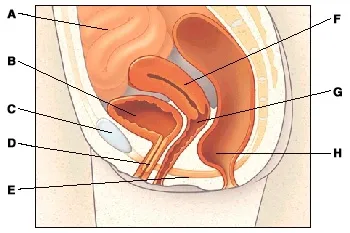Pelvic Organ Prolapse
Pelvic organ prolapse is when one or more organs inside the pelvis slip from their normal places. The pelvis is found between the waist and thighs. Normally, muscles and tissues in the pelvic region support the pelvic organs and hold them in place.
What is a normal pelvis?
A. The small intestine absorbs nutrients from food.
B. The bladder collects and holds urine.
C. The pubic bone helps protect the pelvic organs.
D. The urethra is the tube that carries urine out of the body.
E. The pelvic floor muscles support organs and other structures in the pelvis.
F. The uterus is where the baby develops when a women is pregnant.
G. The vagina is the canal from the uterus to the outside of the body.
H. The rectum stores stool until a bowel movement occurs.
What causes pelvic organ prolapse?
There are several causes of pelvic organ prolapse including:
- Vaginal childbirth
- Hereditary (genetic) factors
- Connective tissue disorders
- Getting older
- Constant coughing (such as with bronchitis or smoking)
- Heavy lifting
- Chronic straining (such as with constipation)
- Being overweight
What are the symptoms of pelvic organ prolapse?
The symptoms of pelvic organ prolapse include:
- A feeling of fullness or pressure in your pelvis
- A sense that a ball or lump is sticking out from the vagina
- Problems passing urine or having a bowel movement
- Urine leakage when you cough or use stairs. (But this can happen even without prolapse.)
- Pain or pressure in your low back
- Pain when having sex
For more information on SBL Women's Health, or to schedule an appointment, call 217-258-4030.









